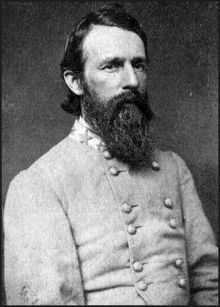Chapter 1
Chapter 1
July 1, 1863, 10:15 a.m.
East of Herr's Ridge
Gettysburg, Pennsylvania
The sun was now steadily rising and the damp moisture of the night finally gave way to the dry warmth of midsummer day. Brigadier General James Jay Archer from Heth's Confederate division pondered what the day ahead would bring. For the past three hours, his twelve hundred men from Tennessee and Alabama had been driving a Union cavalry brigade, part of a whole division, steadily eastward, that had blocked the road to Gettysburg, a small Pennsylvania town. The blue-clad riders had been stubborn. They had positioned themselves loosely behind big rocks, bushes and pasture fences and stoically fired their carbines. Still, Archer's men had driven them out of their positions time and again. The losses had so far been surprisingly light and the morale of the men was accordingly high. After the Confederates had taken the latest ridge, they were now faced with a small body of water that ran parallel to their battle line and had to be crossed. On the other bank, in the northeast, there was a fenced field with a white farmhouse and an annex behind it, while a little further south a small but relatively dense grove was located. Archer was about to give the order to advance again. From his location, he could already make out the characteristic cupola of the Lutheran seminar in Gettysburg and the most direct route to this landmark was through the already mentioned woods.
Suddenly a rider approached him. Archer quickly recognized him as Major Abram Sebastian Van de Graaff, commanding officer of the 5th Alabama Battalion, that formed the left flank of his line and waited for further instructions in skirmish order on the west side of the farm field.
"What brings you here, Major?“, demanded Archer as soon as the younger man had steadied his horse infront of him.
"Sir, I have important news to report, may I speak?“
"Speak frankly, Abram, you look to be agitated“
"General Archer, I believe we are no longer facing cavalry, sir. I scanned the fence line in my front with my field glasses and I am almost certain that there is infantry in my way.“
"No need to worry, as you may remember General Pettigrew informed us yesterday that militias might be in the area. And the shootout of the past few hours has certainly brought even some of these amateurs to the scene. Deliver them a sharp volley and they will be running back to their mothers before your men will have finished reloading.“
"Sir, I fear we are facing men of the Army of the Potomac. Next to a unit of bluebellys I could see a large regiment in fancy zouave uniforms. This is certainly not militia clothing. And, more importantly, their left flank connects directly with the forest in your front. While I would expect an open flank from newbie soldiers, the army men should have learned their lesson from Chancellorsville by now. The poor visibility makes me really uncomfortable. Who knows what might be located in those trees.“
There was silence around the two men as Archer arranged his thoughts. Van de Graaff was only thirty-one, but still a reliable commander who cared for his men. And he was right, when there were zouaves, that actually meant trouble. If Meade's army was already here, that would radically change the equation. Located north of Archer was the 1,700-strong brigade of Joseph Davis, the Confederate president's nephew, but the numbers of the cavalry they had engaged had been comparatively strong. The rest of Heth's division was still a few miles away, and even one or two Union brigades could do serious damage to the Confederates, who were isolated from their main force. In addition, Archer now remembered General Lee's order not to start any major engagement without having concentrated the army first. It was time to make a decision.
"You are right, Major, and I do thank you for this valuable piece of information. If there are army men confronting us, and I believe this to be the case, we are vulnerable in this depression here. You are hereby ordered to hold your ground while I retire the brigade to the ridge in our rear. General Heth must be informed about the situation before I am going to issue any further movement east. Please return to your men!“
As the major reigned in his horse and sped away, Archer barked orders to his other regimental commanders and called for couriers. As his men were orderly retracing their steps in the opposite direction, a lieutenant dashed towards the Chambersburg Pike in order to bear the news to the division commander Henry Heth while a corporal went north with the difficult task to locate the whereabouts of Brigadier General Joseph Davis.

Brig. Gen. James J. Archer, CSA
Last edited:







